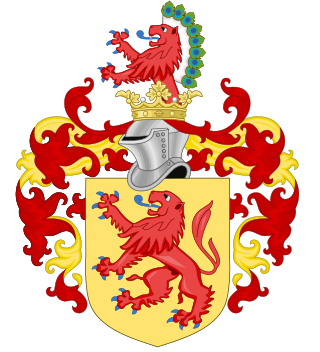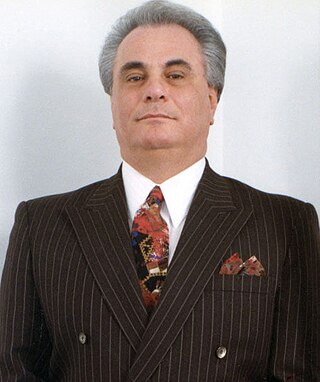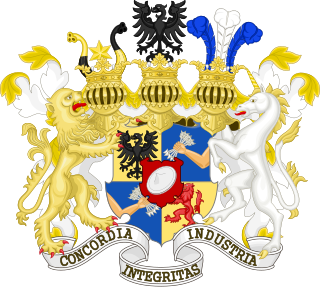
Confucius, born Kong Qiu (孔丘), was a Chinese philosopher of the Spring and Autumn period who is traditionally considered the paragon of Chinese sages, as well as the first teacher in China to advocate for mass education. Much of the shared cultural heritage of the Sinosphere originates in the philosophy and teachings of Confucius. His philosophical teachings, called Confucianism, emphasized personal and governmental morality, harmonious social relationships, righteousness, kindness, sincerity, and a ruler's responsibilities to lead by virtue.
The Kennedy family is an American political family that has long been prominent in American politics, public service, entertainment, and business. In 1884, 35 years after the family's arrival from County Wexford, Ireland, Patrick Joseph "P. J." Kennedy became the first Kennedy elected to public office, serving in the Massachusetts state legislature until 1895. At least one Kennedy family member served in federal elective office from 1947, when P. J. Kennedy's grandson John F. Kennedy became a member of Congress from Massachusetts, until 2011, when Patrick J. Kennedy II retired as a member of the U.S. House of Representatives from Rhode Island.

The House of Habsburg, also known as the House of Austria, was one of the most prominent and important dynasties in European history.

A language family is a group of languages related through descent from a common ancestor, called the proto-language of that family. The term family is a metaphor borrowed from biology, with the tree model used in historical linguistics analogous to a family tree, or to phylogenetic trees of taxa used in evolutionary taxonomy. Linguists thus describe the daughter languages within a language family as being genetically related. The divergence of a proto-language into daughter languages typically occurs through geographical separation, with different regional dialects of the proto-language undergoing different language changes and thus becoming distinct languages over time.

Charles Milles Manson was an American criminal, cult leader and musician who led the Manson Family, a cult based in California, in the late 1960s. Some of the members committed a series of at least nine murders at four locations in July and August 1969. In 1971, Manson was convicted of first-degree murder and conspiracy to commit murder for the deaths of seven people, including the film actress Sharon Tate. The prosecution contended that, while Manson never directly ordered the murders, his ideology constituted an overt act of conspiracy.

The House of Medici was an Italian banking family and political dynasty that first consolidated power in the Republic of Florence under Cosimo de' Medici during the first half of the 15th century. The family originated in the Mugello region of Tuscany, and prospered gradually until it was able to fund the Medici Bank. This bank was the largest in Europe during the 15th century and facilitated the Medicis' rise to political power in Florence, although they officially remained citizens rather than monarchs until the 16th century.
The British royal family comprises King Charles III and his close relations. There is no strict legal or formal definition of who is or is not a member, although the Royal Household has issued different lists outlining who is a part of the royal family. Members often support the monarch in undertaking public engagements, and pursue charitable work and interests. Members of the royal family are regarded as British and world cultural icons.

A surname, family name, or last name is the mostly hereditary portion of one's personal name that indicates one's family. It is typically combined with a given name to form the full name of a person, although several given names and surnames are possible in the full name. In modern times the "hereditary" requirement is a traditional, although common, interpretation, since in most countries a person has a right for a name change.

John Joseph Gotti Jr. was an American mafioso and boss of the Gambino crime family in New York City. He ordered and helped to orchestrate the murder of Gambino boss Paul Castellano in December 1985 and took over the family shortly thereafter, leading what was described as America's most powerful crime syndicate.

The Rothschild family is a wealthy Ashkenazi Jewish noble banking family originally from Frankfurt. The family's documented history starts in 16th century Frankfurt; its name is derived from the family house, Rothschild, built by Isaak Elchanan Bacharach in Frankfurt in 1567. The family rose to prominence with Mayer Amschel Rothschild (1744–1812), a court factor to the German Landgraves of Hesse-Kassel in the Free City of Frankfurt, Holy Roman Empire, who established his banking business in the 1760s. Unlike most previous court factors, Rothschild managed to bequeath his wealth and established an international banking family through his five sons, who established businesses in Paris, Frankfurt, London, Vienna, and Naples. The family was elevated to noble rank in the Holy Roman Empire and the United Kingdom.

Family Guy is an American animated sitcom created by Seth MacFarlane for the Fox Broadcasting Company. The series premiered on January 31, 1999, following Super Bowl XXXIII, with the rest of the first season airing from April 11, 1999. The show centers around the Griffins, a dysfunctional family consisting of parents Peter and Lois, their children, Meg, Chris, and Stewie, and their anthropomorphic pet dog, Brian. Set in the fictional city of Quahog, Rhode Island, the show exhibits much of its humor in the form of metafictional cutaway gags that often lampoon American culture.

Seth Woodbury MacFarlane is an American actor, animator, writer, producer, director, comedian, and singer. He is best known as the creator and star of the television series Family Guy and The Orville (2017–2022), and co-creator of the television series American Dad! and The Cleveland Show (2009–2013). He also co-wrote, directed, and starred in the films Ted (2012) and its sequel Ted 2 (2015), and A Million Ways to Die in the West (2014).
The Gambino crime family is an Italian-American Mafia crime family and one of the "Five Families" that dominate organized crime activities in New York City, within the nationwide criminal phenomenon known as the American Mafia. The group, which went through five bosses between 1910 and 1957, is named after Carlo Gambino, boss of the family at the time of the McClellan hearings in 1963, when the structure of organized crime first gained public attention. The group's operations extend from New York and the eastern seaboard to California. Its illicit activities include labor and construction racketeering, gambling, loansharking, extortion, money laundering, prostitution, fraud, hijacking, and fencing.

The Five Families refer to five Italian American Mafia crime families that operate in New York City. In 1931, the five families were organized by Salvatore Maranzano following his victory in the Castellammarese War.

The Von Erich family is an American professional wrestling family. Originally from Texas, their actual surname is Adkisson, but every member working in wrestling has used the ring name "Von Erich" after family patriarch Fritz Von Erich. Fritz, who wrestled from 1953 to his retirement in 1982, took on the German-sounding name as part of his wrestling gimmick, as he originally portrayed a Nazi heel.
Carlephyton is a genus of four species in the family Araceae, all endemic to Madagascar.
The American Mafia, commonly referred to in North America as the Italian-American Mafia, the Mafia, or the Mob, is a highly organized Italian American criminal society and organized crime group.

Aroideae is a subfamily of flowering plants in the family Araceae. It is the largest subfamily in Araceae and consists of about 72 different genera, and 2,300 species. Many Aroideae have spiny pollen grains without a sporopollenin outer exine layer and lacking an aperture.
Modern Family is an American sitcom television series created by Christopher Lloyd and Steven Levitan for ABC. It aired for eleven seasons and 250 episodes, from September 23, 2009 to April 8, 2020. The series follows the lives of three diverse family set-ups living in suburban Los Angeles, who are interrelated through their patriarch, Jay Pritchett.













